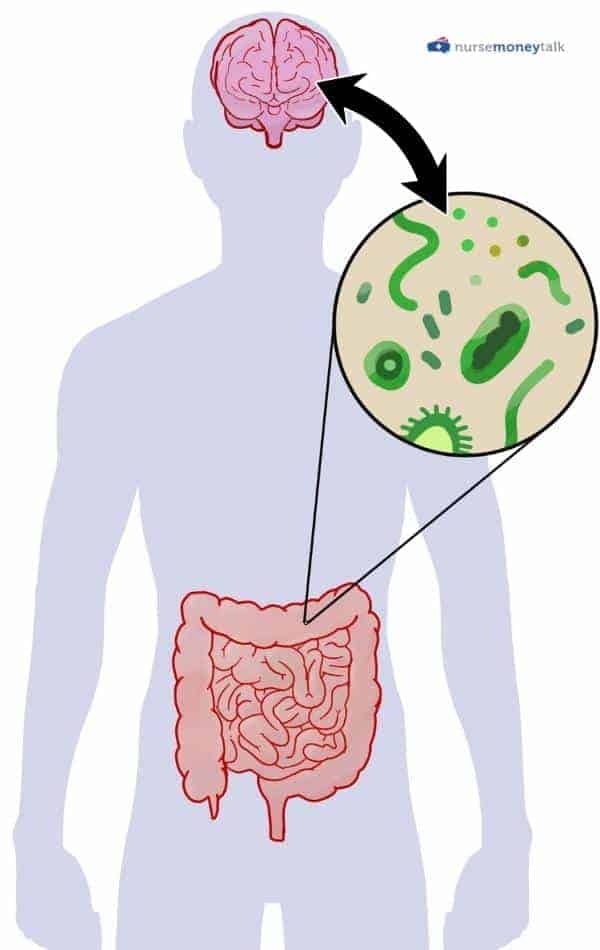Understanding the weaknesses inherent in us as caregivers is a great place to start.
I became a nurse because I was good at taking care of others, not because I was good at taking care of myself. I struggled with healthcare issues throughout nursing school and into my rookie years as an ICU nurse.
You don’t have to make the same mistakes I did, though. I can already tell you’re smarter than I was because you’re here, reading this article.
*Disclosure: This article on how to stay healthy in nursing school may contain affiliate links. If you click and make a purchase, I may receive a commission. For more info, please see my disclaimer.
Staying Healthy in Nursing School
For me, the thing about nursing school was that it was years before I learned anything super-practical about staying healthy.
Of course, I followed all the health and safety guidelines, precautions, and policies, but none of that dealt with self-care. But you don’t know what you don’t know.
From nutrition to sleep hygiene, stress triggers, and much more, this is the advice I wish I’d had about staying healthy during nursing school.
1. Get Plenty of Excercise

The benefits of exercise in terms of physical health is well known. But did you know about the benefits exercising can have on your mind?
Here are just a few of the benefits of regular fitness:
- Better focus
- Improved mood (you’ll just feel better)
- Increased energy
- Decreased level of stress
- Better memory
I know you might not feel like you have enough time to get to a gym. But taking the time to work out might actually help you study better and retain more of the information you’re studying.
Tip for Studying While Exercising
One of the tips I gave in my article on studying in nursing school was that if you make flashcards on an app like Quizlet, you can review those flashcards while running or on the treadmill at the gym.
If making flashcards are not your thing, you can also record and listen to lectures while running or weight lifting.
Are you wondering if these tips work? I can tell you that they do because these were some of the study hacks I did when I was in school.
2. Eat Healthy (Nourish Your Gut)

Have you ever felt like you’re not alone in your body? Turns out, you might not need a psych consult after all. You have a lot of genetic material in your body which is not even human.
Your gut microbiome, housed mostly in your large intestine, is a diverse ecosystem of as many as 39 trillion microorganisms, including friendly bacteria, yeasts, parasites, viruses, and archaea. You also have a microbiome in your lungs, mouth, nose, ears, and on your skin.
There is no work/life balance; with these guys, it’s all work. You coexist in a mutually beneficial relationship. You may not know it, but you couldn’t survive without them.
The presence of those microorganisms contributes to your overall health and wellbeing. This is primarily because your microbiome synthesizes and metabolizes a vast array of chemicals in your body, including hormones and neurotransmitters.
Your gut microbiome is crucial to your health in a few ways. First, it helps you digest food in a way that makes the micronutrients you eat more bioavailable.
Finally, it may help you think more clearly. Scientists used to think that dietary fiber played the biggest role in keeping things moving in the gut. But now acknowledge that gut bacteria metabolize the fiber to make short-chain fatty acids (SCFA).
These fatty acids play multiple roles in your health, including helping your gut communicate with your brain and perhaps even helping improve mental processing.
But how does all of this help you stay healthy? Scientists are learning more every day about how your gut microbiome helps every system in your body, including your immune system.
The more types of plant fibers you eat, the more diverse your gut biome is. Eating all parts of the plant: the leaves, stems, roots, and seeds helps feed different populations of SCFA-producing bacteria.
Studies show that people who eat more processed foods have fewer good bacteria.
Try eating about 30 different types of plant-based foods each week. Don’t limit yourself to fruits and veggies.
Be sure to include a variety of sources, such as whole grains, herbs, spices, coffee, tea, and even dark chocolate. Yes!
On a low-carb diet? No worries, there are plenty of plant-based foods that are also low in carbohydrates.
Nursing Student Academy
Check out the comprehensive supplemental course nursing students are taking to improve their grades and pass nursing school.
3. Drink More Water (From a Quality Water Bottle)

“Don’t forget to water your beans.” I can still hear my third-level med-surg instructor extolling the benefits of drinking water for maintaining and improving kidney function.
Clicks and crackles of the clear plastic water bottles we kept by our sides always followed.
What I wish I’d known was how bad those plastic water bottles were for my health. Each year, more research shows that not only do the chemicals from plastic leach into the water, but we also ingest plastic pieces, causing even more work for our kidneys.
Long story short. Make sure you’re drinking plenty of water. But also make sure you’re using a good quality BPA-free water bottle such as this Nalgene water bottle.
4. Know Your Stress Capacity

One of the first things I learned in nursing school was how a little stress can be a good thing.
In lectures, instructors say that stress provides the mental environment to keep you feeling stimulated, energized, motivated, inspired, and challenged. Science says mild stress creates an optimal learning environment.
All that’s fine, but they didn’t teach me how to understand stress, recognize the triggers, or manage it when it became too much.
The thing is, how much you’re up for the challenge depends on your current capacity. If you have room for it, slight stress can make you feel ready for the challenge.
You may feel nervous but also buzzing with excitement. You might have experienced this if you have ever prepared really well for a test or clinical procedure.
If stresses like these are short-lived, and if they don’t appear too often, then you’ll feel stimulated and engaged. If you go too long without a challenge in your life, you will probably become bored and under-stimulated. — This is not usually a problem in nursing school.
The point is when you become aware of feeling stressed, tune into it. This is really important information.
Very often in life, you don’t realize how stress affects you until you do something that stresses you, and you end up reacting in surprising ways like speaking sharply to someone or sending a chippy text or an email without thinking it through.
When you recognize the feelings of stress, try to figure out what triggered them. It might not be immediately obvious.
You might have to trace back when you felt stressed. What was it that exceeded your current capacity to cope?
- Was it something that someone said?
- Was it something that made you feel out of control?
- Was it a worry about an imminent event?
- Was it something you had forgotten to do?
- Was it long-running stress about your family, finances, career?
Rather than judging yourself for feeling stressed, think, “hmm, interesting.” It’s a data point that can help you learn to control stress triggers and regulate your capacity for stress.
Talk to a Therapist Online
Venting can be very therapeutic but relying too much on friends and family can be a bad thing. Instead, seek out a licensed therapist who’s also a neutral third party at your convenience. For a limited time get a 20% discount.
Related: How to Handle Stress as a Nursing Student
5. Lean into Sleep

Throughout nursing school and into my nursing career, I treated sleep as an enemy.
Not only did I feel it was a sign of weakness, but I felt guilty for choosing to sleep. I thought it impeded living my life. Unfortunately, my health, metabolism, and wellbeing all suffered before I gave sleep the respect it was due.
Did you know that having a poor night’s sleep can cause a genetic response that negatively influences your health in the future? This is just one of the interesting sleep facts I’ve learned recently.
Here are a few more.
- Sleep is vital for brain health.
- When you’re asleep, some parts of your brain are more active than when you’re awake.
- When you’re asleep, your brain is carrying out essential housekeeping to keep your body and mind performing well, and to maintain the long-term health of your brain.
- Sleep improves brain functions that include processing new information and moving learning from short-term to long-term memory, which allows you to access information when you need it more easily.
- During sleep, your brain maps out new connections and neural pathways that allow you to have innovative ideas when you wake up.
- During sleep, your body is clearing out damaged cells in your body which are associated with disease.
- Sleep regulates metabolism and decreases the rate of obesity despite diet.
- It takes about 9 hours to get through all the stages of sleep you need for your body to accomplish all this important work.
Today, sleep is my favorite thing. When my kiddos laugh at me for going to bed early, I just smile and say, “It’s nine o’clock somewhere.”
6. Build Your Resilience

Inevitably, nursing school will bring challenges into your life. By cultivating particular states of mind, you can cushion your wellbeing from adversity.
Practicing gratitude and kindness helps balance out the relentless negative messaging you receive from the sometimes brutal healthcare culture, social media, and current events.
Lastly, make sure you’re practicing random acts of self-kindness and taking the time to silence your inner critic, and learning where those critical voices in your head are coming from.
Bring awareness to these voices and begin to rewrite the unhelpful messages you send yourself.
7. Seek Out Professional Help
If you’re the type of person who hates asking for help, you will hate this tip. But hear me out.
Sometimes you can’t do it by yourself, and there’s nothing wrong with that.
There comes a time when maybe you’re so stressed that you need to seek out a professional therapist for guidance. Perhaps you realize that part of your stress is that you’re struggling in nursing school and need a tutor’s help (go here to find a tutor for nursing school).
Maybe it’s not directly related to nursing school, and you need help with exercising, so perhaps you need a personal trainer.
Just like how we seek professional help when it comes to our physical health (i.e., primary care physician) in other parts of our lives, we also need help from professionals.
Self-Care Makes Happy Healthy Nursing Students.
I hope this abbreviated list of five ways to stay healthy in nursing school resonates with you as I believe it would have with me during my younger days in nursing.
Remember the practice of self-care reduces stress, builds resilience, and replenishes a student nurse’s ability to provide compassion and empathy.
It also improves the quality of care you’ll be giving.
Struggling in Nursing School
If you’re struggling in nursing school, make sure to check out the nursing student academy. It’s a comprehensive course that assists nursing students in learning those tough nursing school topics.
Have You Read These Articles?
- 10 Best Healthy Snacks for Nurses
- 10 Inspiring Nursing School Quotes
- How to Stay Positive During Nursing School


